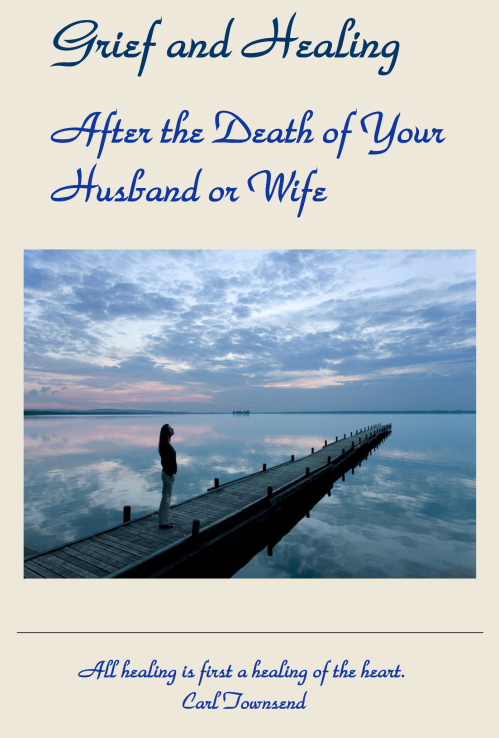

Traditional marriage ceremonies declare that “the two become one.” No one fully realizes what this means until one’s husband or wife has died. A man in a grief support group said when he lost his wife, he lost a host of people – his wife, his friend, his lover, his companion, his partner, his primary supporter...and more. Whether the marriage has lasted decades or days, two people functioning in union combine to be more than the sum of the individuals. And when one dies, the remaining person feels less than the whole person that people see. When a spouse dies, the other spouse often feels that a part of him or her has died. It takes awhile to realize that a part of the deceased husband or wife lives on in the survivor. A great number of emotional, cognitive, spiritual, physical and practical adjustments lie before a man or woman whose spouse has died.

Memories are both blessings and challenges for surviving spouses. One’s memories of a shared life are all that remains to hold onto after the death. Fear of losing memories is common, especially when grief interferes with thinking, concentration and remembering. Because so many memories are shared only by the husband and wife, the one who lives on has to bear the shared memories alone. Without the other witness to their life together, a spouse may wonder what parts of their precious story he or she is forgetting. Fortunately, most people’s memories endure the rigors of grief. For a time, all memories bring pain. Remembering means accepting the finality of the death. Later, memories are more likely to give comfort as reminders of what they enjoyed, what can never be taken away – the precious gift of a shared life that didn’t have to happen, but did.


Grieving spouses deal with a wide variety of major adjustments and challenges that can seem overwhelming, all without the help and support of the one who has always been there in hard times. That loss of love, support and help is the biggest loss of all. An empty home, a lonely bed, no sounding board for thoughts, feelings and important decisions become more than just the absence of someone. The absence has substance, standing in the way of functioning with confidence day-to-day.
Add to that a multitude of irritants, practical problems and social impacts and the magnitude of adjustment comes into focus. Many a support group conversation has centered on the breakdown of mechanical and electrical things after the death of a spouse. Cars, refrigerators, computers and water heaters seem prone to expire soon after one of their owners does. Most couples develop a workable division of labor, jobs and tasks each one does without much involvement of the other. Suddenly, the survivor has to deal with finances, real estate, repairs and other responsibilities he or she has neither the knowledge nor desire to take on. Socially, the widowed person finds almost everyone struggling with how to handle their grief. Groups of couples often leave out newly bereaved spouses. Family and friends may withdraw due to lack of confidence in their ability to say or do the “right thing” to provide support. Work, faith communities and other social settings can become uncomfortable environments, in which widowed people find themselves isolated and alone. The thought of new relationships, be they friendships or romantic connections, can be daunting to someone who is grieving. It is hard to make new relationships when one’s heart is occupied with longing for a dead spouse. And one who is hurting and struggling just to get by may lack the energy and courage to open up or reach out to new friends or potential dates.

There’s a kind of helplessness that may come with grief. You are facing a problem without a solution. Your spouse has died and there’s no way to undo that circumstance. Many people look forward to a spiritual reunion or feel an ongoing spiritual connection. That is not the same as sharing life, day to day, with a living, flesh-and-blood person. In that helplessness lies the inclination to endure grief silently and alone, acting like it doesn’t hurt or you’re handling it better than you are. Eventually you may become used to the feelings of loss and think that time has healed you. Sadly, people end up carrying around great weights of accumulated sadness that they thought was behind them just because time had passed. That baggage can result in weariness, a lack of enthusiasm or hope, emotional and relationship problems, even physical health problems.
If you find that your thoughts, emotions and actions are troubling you, interfering with your life and sense of well-being, you can do something about it. The decision to try to get better is very often the point at which helplessness dissolves and improvement begins. Just imagining that there might be life beyond your grief can be a tremendous relief. The alternative is the fear that you may feel this sad and wounded for the rest of your life. Most people would rather not have to endure that.
Grief is normal and natural. Grief goes with loving. When you love someone, you hurt when that person dies. In a way, it is a cost of loving. Sometimes people wonder, when they are stricken with the deepest pain of loss, if it was a mistake to love so much. When asked, “Would you have had it any other way?” the answer is always, “No!”

The love you shared with your husband or wife proves that you are lovable. Now it’s time to love yourself enough to take care of yourself in your grief. The love of family and friends, guidance from reading books and internet resources and attendance at grief support groups, classes and counseling all can contribute to your ability to endure the pain, take effective steps to address your grief and recover a new sense of well-being as you continue life without your spouse.


